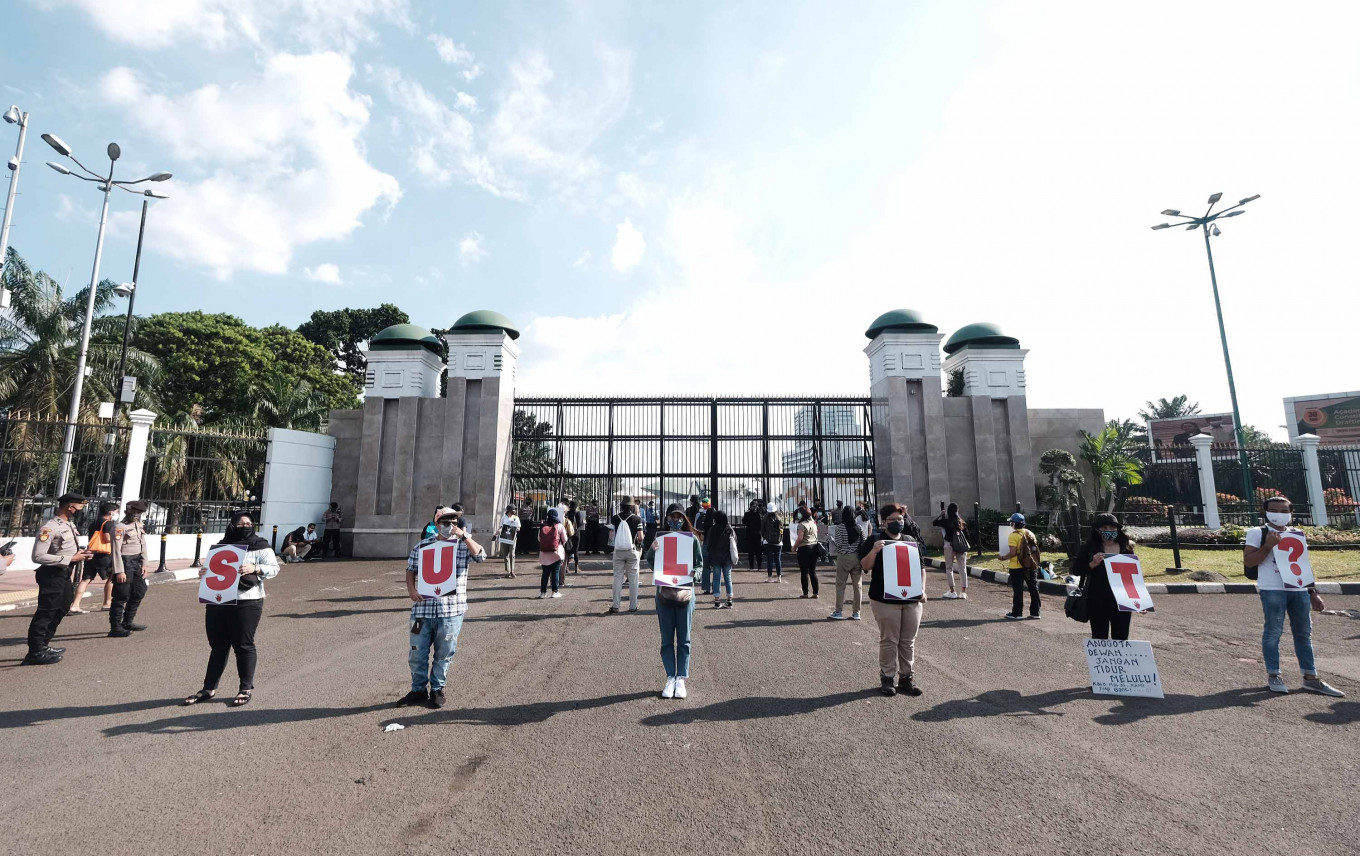Popular Reads
Top Results
Can't find what you're looking for?
View all search resultsPopular Reads
Top Results
Can't find what you're looking for?
View all search resultsSexual violence eradication bill: The canary in the coalmine
Besides the high incidence of sexual abuse and violence in Indonesia, the Indonesian Criminal Code (KUHP) has a very narrow definition of rape, basically, penile penetration.
Change text size
Gift Premium Articles
to Anyone
You have most likely heard of the #MeToo movement against sexual abuse, but have you heard of the “Weinstein effect”?
Like #MeToo, it’s a global trend of “exposing allegations of sexual misconduct by famous or powerful men”. It started in the United States after the allegations against film producer Harvey Weinstein in 2017, described as a watershed moment that “precipitated a national reckoning against sexual harassment”.
The list of celebrities and politicians – mainly men – who tumbled from their high positions as a result of allegations against them, or actual sex crimes they committed, was like a list of who’s who in their respective fields, and not just in the US. It shook up politics, the media, the entertainment industry, fashion and also educational and religious institutions.
The Hollywood movie mogul himself was found guilty of a criminal sexual act and rape in the third degree in February, and in March was sentenced to 23 years’ imprisonment. In fact for 30 years there had been claims of sexual misconduct against him, but he got away with it until The New York Times broke the first reports on Oct. 5, 2017. The allegations against him were enough to have him removed from The Weinstein Company.
Despite the fact that the incidence of sexual abuse and violence in this country is alarmingly high, both the #MeToo movement and the Weinstein effect seem to have skipped Indonesia. Why is this?
Okay, I realize we are light years away from a post-patriarchal world, but in Indonesia, patriarchy is extremely deeply entrenched.
Mutiara Ika, coordinator of Perempuan Mahardika, a women’s NGO, stated that "Violence against women is systemic [and] the government has neglected the marginalization and repression of women".
Alas, it is much, much more than neglect! Neglect is a sin by omission, whereas it is actually a sin by commission. Indonesia, the land of smiles, has an inherent rape culture which the state proactively fosters.
Rape culture is a term coined by feminists in the US in the 1970s designed to show the ways in which society blamed victims of sexual assault and normalized sexual violence.
Emilie Buchwald, author of Transforming a Rape Culture (1994) defines it as being “a complex set of beliefs that encourage male sexual aggression and supports violence against women. It is a society where violence is seen as sexy and sexuality as violent.”
Rape culture includes “victim blaming, slut-shaming, sexual objectification, trivializing rape, denying widespread rape, refusing to acknowledge the harm caused by sexual violence”.
And there are the sexist songs, the demeaning jokes, degrading remarks and the victim blaming, which even our top leaders engage in.
Jusuf Kalla, then vice-president, in 2006 said young divorcees in Puncak (a hillside area 80 kilometers south of Jakarta) could be offered to tourists from the Middle East to help promote tourism. In 2011, Fauzi “Foke” Bowo, then governor of Jakarta, commenting on a spike in the number of rapes in the capital, suggested that “women should stop wearing miniskirts when they ride in minivans so as not to arouse the driver and other male passengers”. In 2017, Tito Karnavian, then chief of the Indonesian National Police, told the press that his officers routinely asked rape victims if they enjoyed being raped.
What hope do we have when our leaders who are supposed to protect us women, have this sickeningly misogynistic mindset?
Recently, women activists were crushed by the dropping of the sexual violence eradication bill (RUU PKS) from this year’s National Legislation Program (Prolegnas) priority list (see “'Difficulties' surrounding sexual violence eradication bill” by Valentina Sagala, The Jakarta Post, July 4, 2020).
Besides the high incidence of sexual abuse and violence in Indonesia, the Indonesian Criminal Code (KUHP) has a very narrow definition of rape, basically, penile penetration. If there are no signs of resistance, or if the rape had occurred repeatedly over a long period of time, hey, it must have been consensual.
Sexual violence covers a very broad range of activities and the intermeshing of all the psychological, social, cultural, ideological and political aspects are extremely complex. Hence the urgent need for a sexual violence eradication law, besides its alarming prevalence, which has reached pandemic proportions. COVID-19, move aside!
The constant delay in the deliberations of the bill, which were initiated in 2012, is in many ways like the canary in the poisonous gas-filled coalmine that is Indonesia.
Let’s start with corruption. According to the Corruption Eradication Commission (KPK) the House of Representatives and Regional Legislative Council are the most corrupt institutions in the nation. There is no money to be made from turning the sexual violence eradication bill into law and in the end, our honorable legislators can only get aroused if there is money to be made from passing a certain bill.
Indonesian lawmakers are said to operate on the principle of 4D: datang, duduk, diam, duit (attend, sit, stay silent, money) and invariably fall short of their target for passing laws. The Indonesian Parliamentary Concerned Community Forum (Formappi) found that the legislative products of the 2014-2019 period were also full of elite interests.
The state is a body that can legally use violence. Besides outdated cultural traditions, reactionary religionism that permeates the nation, patriarchal and elitist politics, sexual violence against women is also a reflection of this fact, and impunity reigns supreme.
So will Indonesia have its national reckoning against sexual harassment like in the US? Don’t hold your breath – it’s a masculine war of attrition. But if women have anything going for them, it’s staying power!
***
Author of Julia’s Jihad










